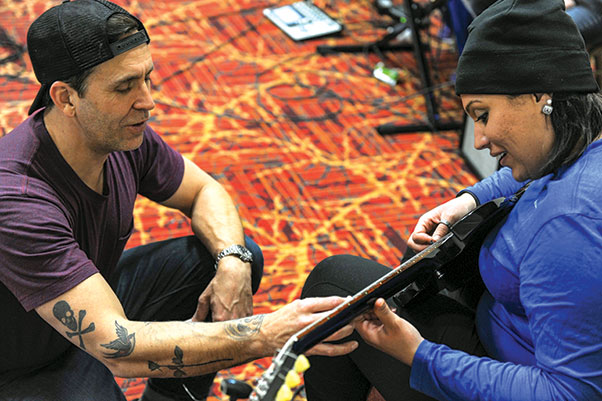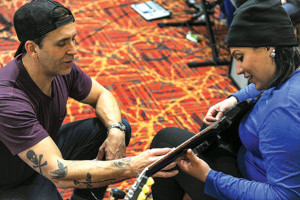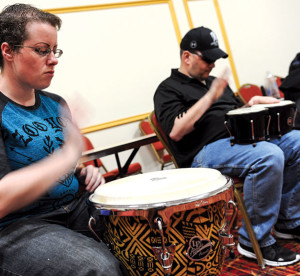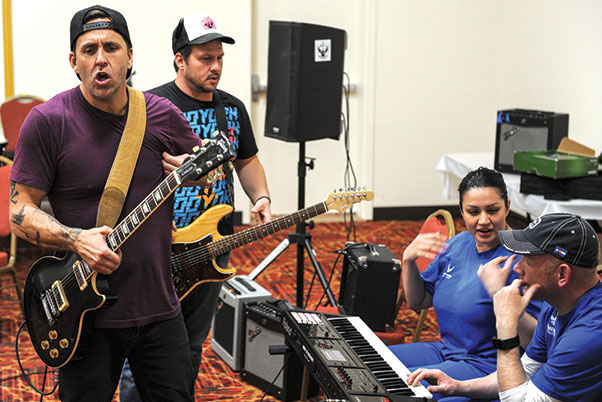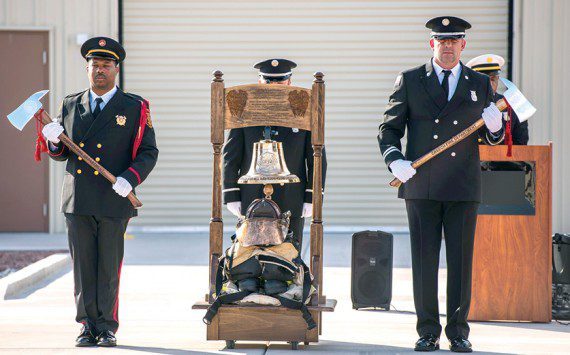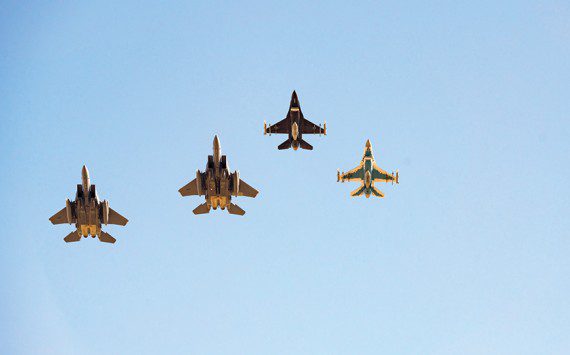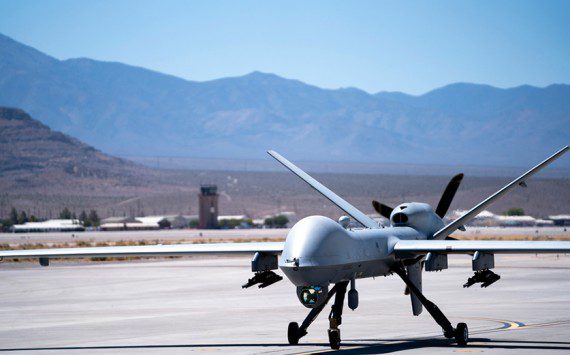Former Korn guitarist and Rock to Recovery founder Wes Geer gives pointers to an Air Force Wounded Warrior Trials participant during a Rock to Recovery practice session in Las Vegas, March 1. Rock to Recovery brings together people suffering from similar ailments and each participant shares their personal story before choosing from a variety of instruments to play as part of a band.
LAS VEGAS — Although many of this year’s Air Force Wounded Warrior Trials participants are now reveling in the celebration the event brings through competition and companionship, every single one of them could tell you what they were doing and exactly how they felt when they hit rock bottom.
For former Korn guitarist Wes Geer, the bottom came after a drug and alcohol binge in 2003.
“I had a long struggle with addiction, and I know what it feels like to be lost and alone — like your life will never get better,” Geer said. “Although I would never compare my life to what a warrior goes through, I know where they end up is a very similar place to where I was. When I was in that place, music took on a new meaning.”
Geer said when he attended rehab that the group of 20 recovering addicts would hang out in cliques, but when he played his guitar during breaks everybody came together.
“That stuck with me,” Geer said. “When I played with Korn we went all around the world and the singer, Jonathan Davis, was always visiting military bases and wounded vets. I would hear their stories and it really started resonating with me, so I decided I wanted to do something to leave my mark on the planet and use music to help people.”
After almost a decade of sobriety, Geer founded Rock to Recovery in 2012 and took the program to rehab centers, mental health clinics, and facilities for at-risk youth.
Rock to Recovery brings together people suffering from similar ailments and each participant shares their personal story before choosing from a variety of instruments to play. A “band” is then formed and the song writing begins. The recovery-based lyrics to each band’s song are based on the participants’ feelings.
In 2014, Geer circled back to a contact he made from his Korn days and eventually was linked to the AFW2 program.
Air Force Wounded Warrior Trials participants play the drums during a Rock to Recovery practice session in Las Vegas, March 1. One slight deviation to the Rock to Recovery program unique to the AFW2 Trials is the band’s live performance at the games’ post-event banquet.
“This is our third anniversary, and actually our first (military wounded warrior event) ever was at Nellis (during the trials),” Geer said. “It’s such a humbling experience to work with wounded vets. When you hear ‘wounded warriors’ you think missing limbs, but when you hear their stories it’s not so much what you see but what they’ve been through and how they feel.
“So how music comes in to play with that is you have the catharsis of playing a song — our song that’s for us, by us — we have that unity and connection, which is the opposite of loneliness, isolation and hopelessness, and changes it to what I think is the key — love. Music is a vehicle to get us there in a magical, almost unexpected way.”
One slight deviation to the Rock to Recovery program unique to the AFW2 Trials is the band’s live performance at the games’ post-event banquet.
During the 2017 AFW2 Trials, former Senior Airman Eva Anderson attended the games as a caregiver for her medically-retired husband and was urged to participate in the Rock to Recovery program by one of the band members.
“I have loved music since I was a kid growing up, singing at church,” Anderson said. “I kind of gave up on music, and for the last six years the only singing I did was in the shower or the national anthem before base events. That was it, but now I’m going to go back to Arkansas and try to find other musicians who might be willing to jam together.”
Former Korn guitarist and Rock to Recovery founder Wes Geer gives suggestions to Air Force Wounded Warrior Trials participants during a Rock to Recovery practice session in Las Vegas, March 1. Geer created the Rock to Recovery program to help people recover through music after seeing its effect on his own recovery from addiction.
Although the AFW2 Rock to Recovery band disbands following their final performance in front of friends and family, the lessons learned from the jam sessions with Wes will stick with them throughout their recovery.
“I’m so thankful for Wes bringing Rock to Recovery here, jamming with us,” Anderson said. “It’s been really an invigorating experience, I mean I’ve seen people who’ve never touched a keyboard before go at it on a bass and melody riff. And this is my first time playing percussion and I’m absolutely loving it. Music is healing, it’s just that simple.”






